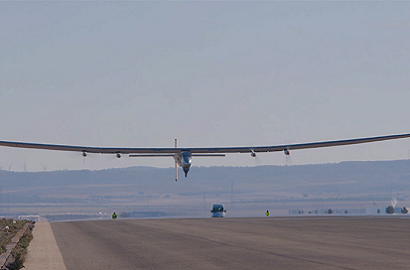EIB Finances Skydweller Autonomous Aircraft Development in Spain

It has plans to provide the company with a 30-million-euro loan to help it launch its solar-powered aircraft
The European Investment Bank (EIB), supported by the InvestEU programme, has granted a 30-million-euro loan to Skydweller, the European subsidiary of US-Spanish Skydweller Aero, to support the company's continued development and forthcoming production of its unmanned, solar-powered autonomous aircraft for civil and security applications.
The loan is underpinned by the EIB's Strategic European Security Initiative (SESI), in view of the aircraft's link to the defence and security sectors. The aircraft being developed by Skydweller will be able to provide services related to telecommunications, intelligence and surveillance, among others, thanks to capabilities such as communications relay, 4G/5G mobile telephony, day and night full-camera video imaging, satellite communications and imaging radar.
Surveillance in trouble spots
Capable of carrying loads of up to 400 kg, its battery and solar-powered propellers allow it to stay aloft much longer than conventional autonomous unmanned aircraft. In fact, it aims to stay aloft 365 days a year at a maximum altitude of 35,000 feet, at least in equatorial and tropical zones. It is also completely silent, making it ideal for surveillance in hot spots, and its lack of heat makes it virtually immune to certain surface-to-air missiles.
Skydweller Aero is based in the United States and Spain, from where European operations are managed. It employs more than 80 high-tech engineers in Madrid and conducts flight testing in Albacete. Production is also planned in Italy. Skydweller's plane is an unmanned evolution of the Solar Impulse 2, which completed a round-the-world flight in 2019 powered only by solar energy, this time with two crew members. The current model can operate with a pilot on board, with a remote pilot on the ground, or with a redundant autonomous flight control system that will allow it to operate without a human pilot in the future.
European genesis
Skydweller CEO and co-founder Robert Miller noted that “the genesis of this aircraft and the vision to build a solar-powered air platform capable of perpetual heavy-lift flight operations originated in Europe”. He added, “This EIB financing will allow us to take it to the rest of the world.”
Commenting on the choice of our country, Miller added, “The engineering capabilities we have in Spain are some of the best I have seen and are a key element of the programme and the engineering investment it represents. Our aircraft's impeccable safety record, proven performance in a wide range of environmental conditions, the transition to state-of-the-art autonomous flight control systems and our world-class facilities are the perfect combination to make solar-powered perpetual flight a reality.
Zero-emission aerospace industry
EIB Vice-President Ricardo Mourinho Felix said, “We are delighted to support Skydweller's next generation of sustainably-powered aircraft and contribute to the development of a zero-emissions aerospace industry. The project is also the latest example of how the EIB is using the InvestEU programme to support and grow companies focused on technological innovation and digital technologies that contribute to Europe's economic growth, decarbonisation, competitiveness and strategic autonomy.”
EU Economic Affairs Commissioner Paolo Gentiloni added, “The development of innovative products requires funding and this is where the InvestEU programme can play a key role. I am delighted that InvestEU is supporting investment in cutting-edge green and aerospace technologies through this agreement, demonstrating that progress in innovation and contributing to the green transition can go hand in hand.”
Connectivity solutions
In 2021, Skydweller signed an agreement with Telefónica to explore the development of connectivity solutions to bring affordable broadband to remote regions and places where natural disasters affect terrestrial networks.
If all goes according to plan, the commercial launch of Skydweller's aircraft will take place in early 2025, as Miller explained in an interview with Expansión, and in which he valued the investment made so far at around 253 million euros.
Photo: Skydweller Aero




